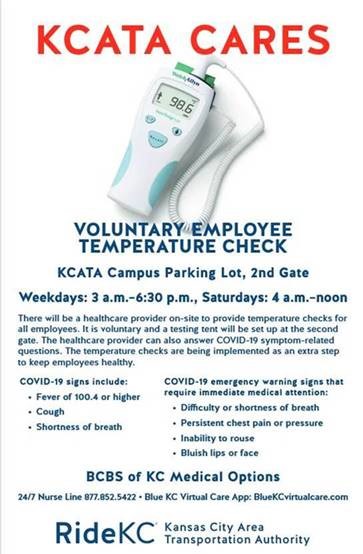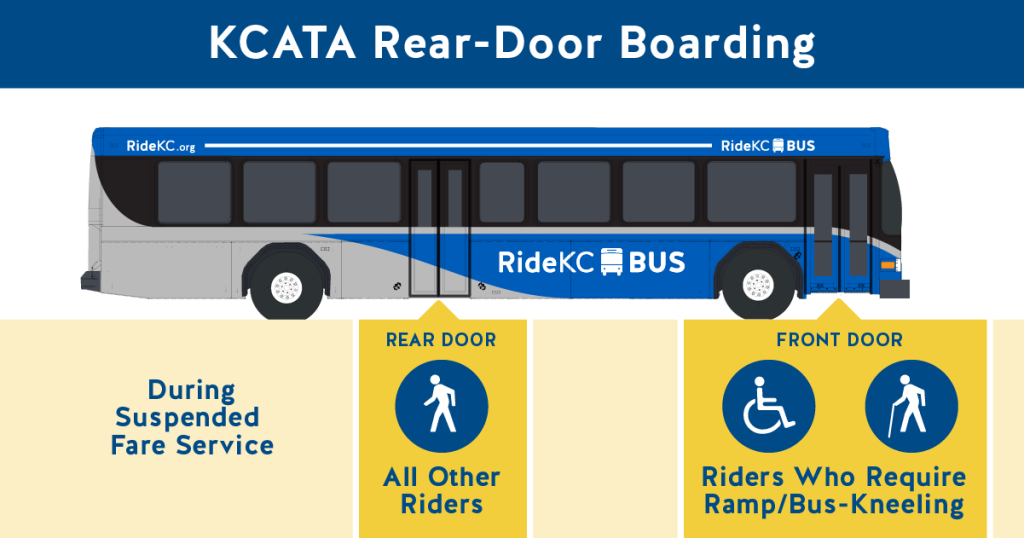 Update 3/25/2020: The KCATA has moved to rear door boarding only starting today unless a passenger needs the ramp or kneeling feature. Additionally, KCATA has also implemented voluntary employee temperature checks at the KCATA home campus. See the graphics for more inforamtion.
Update 3/25/2020: The KCATA has moved to rear door boarding only starting today unless a passenger needs the ramp or kneeling feature. Additionally, KCATA has also implemented voluntary employee temperature checks at the KCATA home campus. See the graphics for more inforamtion.
The Kansas City Area Transportation Authority has released the following information as an update on our efforts to keep our customers and employees safe.
“RideKC is working hard to proactively and rapidly take steps to minimize exposure for the safety of our employees and customers,” says Robbie Makinen, KCATA president & CEO. “I’m very proud of our operators for continuing to show up for work and serving on the front lines during this global pandemic. We’re not going to run away from the people who need us most. We’re going to run toward them. It doesn’t take a medical degree to do what our drivers do every day, it takes courage and heart. But like first responders, our drivers are requesting precautionary measures, such as protective equipment like gloves and masks. We are struggling to equip them with the protection they need to keep customers moving. KCATA and ATU Local 1287 recognize that not everyone has the ability to work remotely and that many of the support and essential jobs in healthcare and our food systems are held by bus riders.”
We will adhere to the CDC guidelines and take preventative measures as necessary.
RideKC is currently running full service and is committed to getting people to jobs, grocery stores and essential services. Based on the recent Stay-At-Home order, RideKC is poised to implement a reduced transit schedule as early as Wednesday, March 25, 2020, for the benefit of public health. Please refer to ridekc.org or our social media channels @ridekctransit.
RideKC is committed to providing continual communication to the community during this emergency and has done so for several weeks.
KCATA took early steps in the fight against COVID-19, many of which are listed below:
VEHICLES, BUS OPERATORS AND COMMUNITY
- Buses are being sanitized every night with a misting sanitizer using stabilized aqueous ozone. The compound is H203. Stabilized aqueous ozone is a food-grade safe, sustainable alternative to traditional chemical cleaners and sanitizers. It has been used to sanitize drinking water, produce and surgical instruments.
- Wiping down all hard touch surfaces on all KCATA buses with a sanitizer (stanchions, seats, hold bars, grips and drivers’ areas, including steering wheel, dash, side panel, farebox, grab bar and seat belt).
- Paratransit vehicles are being sanitized every night with similar processes as the buses.
- Immediately removing buses from service for cleaning if a passenger creates an unsanitary condition from a sickness of any kind.
- Successful evaluation of all cleaning methods and products by a third-party infectious disease cleaning professional to ensure effectiveness.
- Providing hand sanitizer on buses for customer use, installed at the front of the bus.
- Suspended fare on all RideKC buses (KCATA, Johnson County, Kans., Kansas City, Kans. and Independence, Mo.) to minimize customer touchpoints and limit interaction between passengers and operators on the bus.
- Placed signs to encourage social distancing on bus seats requesting all customers to observe safe social distancing.
- Temporarily closed the Customer Service Lobby to protect customers and employees in support of social distancing, limiting locations for pass sales, lost and found, and walk-in traffic.
- Changed Lost and Found Policy to limit item storage to only essential items (keys, wallets/purses, mobile phones/laptops; and medication).
- All bus operators use barriers to shield from physical contact.
- Providing operators gloves and masks as available. More hand sanitizer, disinfectant wipes, and gloves are on order.
- Suspended all in-person community events.
- Suspended all guests on the KCATA premises without prior authorization.
- Moved all major vendors to ACH pay to eliminate paper check touchpoints and need for on-site employees.
